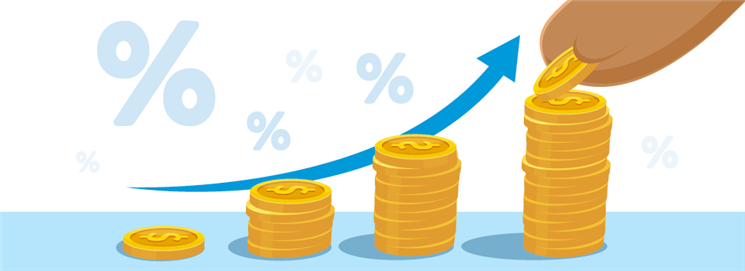Savings Goal Calculator
Regular saving is the key to financial stability and reaching goals. With this calculator, find out how much to save each month to hit your target amount.
How Much Should I Save Each Month?
Enter your savings goal, your initial investment, time frame, and the interest, and you'll know exactly how much to save each month.
 |
Wondering how these factors work with each other to give you the answer? Find out below.
Factor #1: Desired Final Savings
 |
If nothing else, the one thing you should have figured out is how much you want to end up with. Here are some questions to ask yourself:
- What plans do you have for that money?
- Have you accounted for any extra "padding," if needed?
- Are you able to rely on other sources of money for your goal (like a partner's money market account, for example)?
Once you have your savings goal number determined, you're ready to move forward.
- Down payment on a house
- Vacation/travel
- Engagement ring
- Emergency fund (check out our handy calculator for this)
Factor #2: Initial Investment
 |
Saving has to start somewhere! If you're using an existing savings or investment account to stash your cash, you probably already have a balance, so go ahead and add that here.
Or, if you're opening a new account, the financial institution might require a minimum initial deposit, which you can add to the initial investment field.
Finally, if you're expecting an influx of cash soon that you know you're going to use for this, be sure to account for that.
Factor #3: When Will You Reach Your Goal?
 |
It's important that your timeline is appropriate for your savings goal.
For example, if you want to save $1 million in 3 years, you probably won't like what the calculator tells you.
With extreme savings goals like that, your lifestyle would probably need to be altered so drastically that the goal itself becomes impossible.
Since everyone is different, we can't make a specific recommendation in terms of how long you should save for.
Instead, consider this: popular savings plans like the 50-30-20 Rule suggests setting aside 20% of your monthly income for savings, while ambitious plans like FIRE (financially independent, retire early) advocate saving up to 75% of your monthly income, if possible.
75% probably a bit extreme, so try to stick to 20% - 40% and work out your timeline from there.
If you were to save roughly 20% of your income each month, how long would it take you to reach your goal? Luckily, when we factor in interest, it won't take that long. Keep reading to find out more.
Factor #4: Interest Rate
 |
When saving up for a big expense, many people put their money into a savings or investment account to leverage the interest rates.
Why? Simple: It makes your money go farther than if you were to make regular contributions alone.
If you're taking this route, find out what your interest rate is. Here's what your rate may be, depending on where you put your money:
- Traditional savings account: 0.01%
- Online high-yield savings account: 3.75%
- Money market account: 1.55%
- Certificate of deposit: 3.75%
APY stands for Annual Percentage Yield. This is the return you get over a 1-year period based on the interest rate and compounded interest (which means that your interest earns interest). Simply put, 1.00% APY means 1% interest. This means if you save $100, you will earn $1 in interest in a year.
Factor #5: Compound Interest Frequency
 |
Above, we mentioned that many people like to put their cash in savings or investment accounts in order to take advantage of interest.
How much does interest really do? A lot, actually, thanks to compound interest.
Compound interest is interest that you earn on both your original investment and on the interest that your investment accumulates.
Whether you make regular contributions or rely purely on interest, your balance grows bigger. And when the interest compounds, the amount that is added to your balance is a percentage of that ever-growing number. Pretty nice, huh?
Keep in mind that some accounts compound more frequently than others. Be sure to check how frequently your interests compounds so the calculator fits your situation.
While similar to the interest rate, the APY is different in that it factors in compounding interest. The APY takes into consideration how often your bank compounds interest, whether it be quarterly, monthly, or even daily. The APY, therefore, gives you a more accurate idea of how much interest you will earn than just the flat interest rate.
Bottom Line
 |
Saving up money can take discipline, but with a few bits of basic info, you have all you need to stick to your savings plan.
You'll be in the best position if you can commit to the suggested monthly contributions, but just remember that any amount you save is better than nothing. Just be patient, spend wisely, and try to plan ahead when possible.
Holly Zorbas is a assistant editor at CreditDonkey, a personal finance comparison and reviews website. Write to Holly Zorbas at holly.zorbas@creditdonkey.com. Follow us on Twitter and Facebook for our latest posts.
Note: This website is made possible through financial relationships with some of the products and services mentioned on this site. We may receive compensation if you shop through links in our content. You do not have to use our links, but you help support CreditDonkey if you do.
|
|
|





